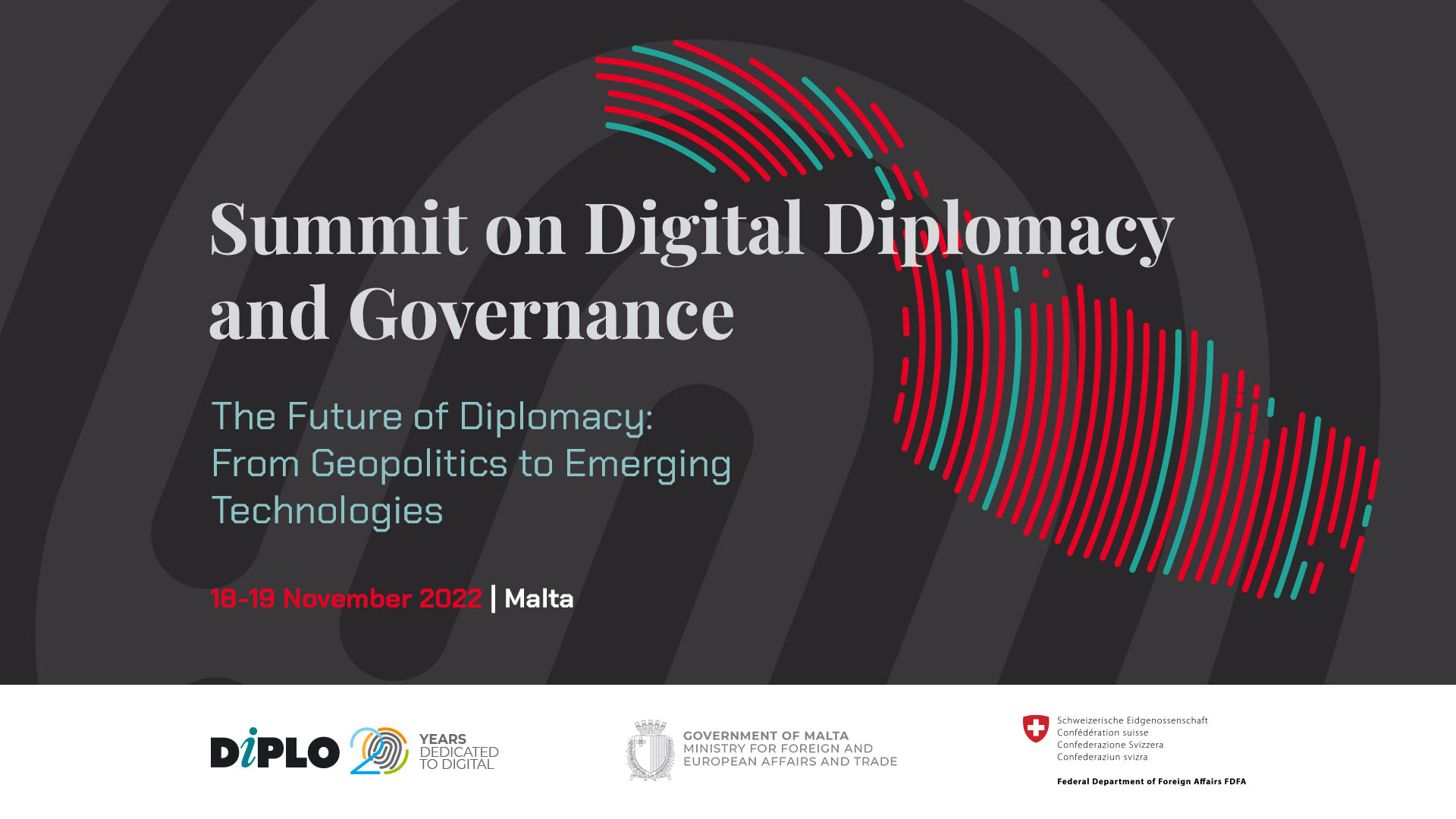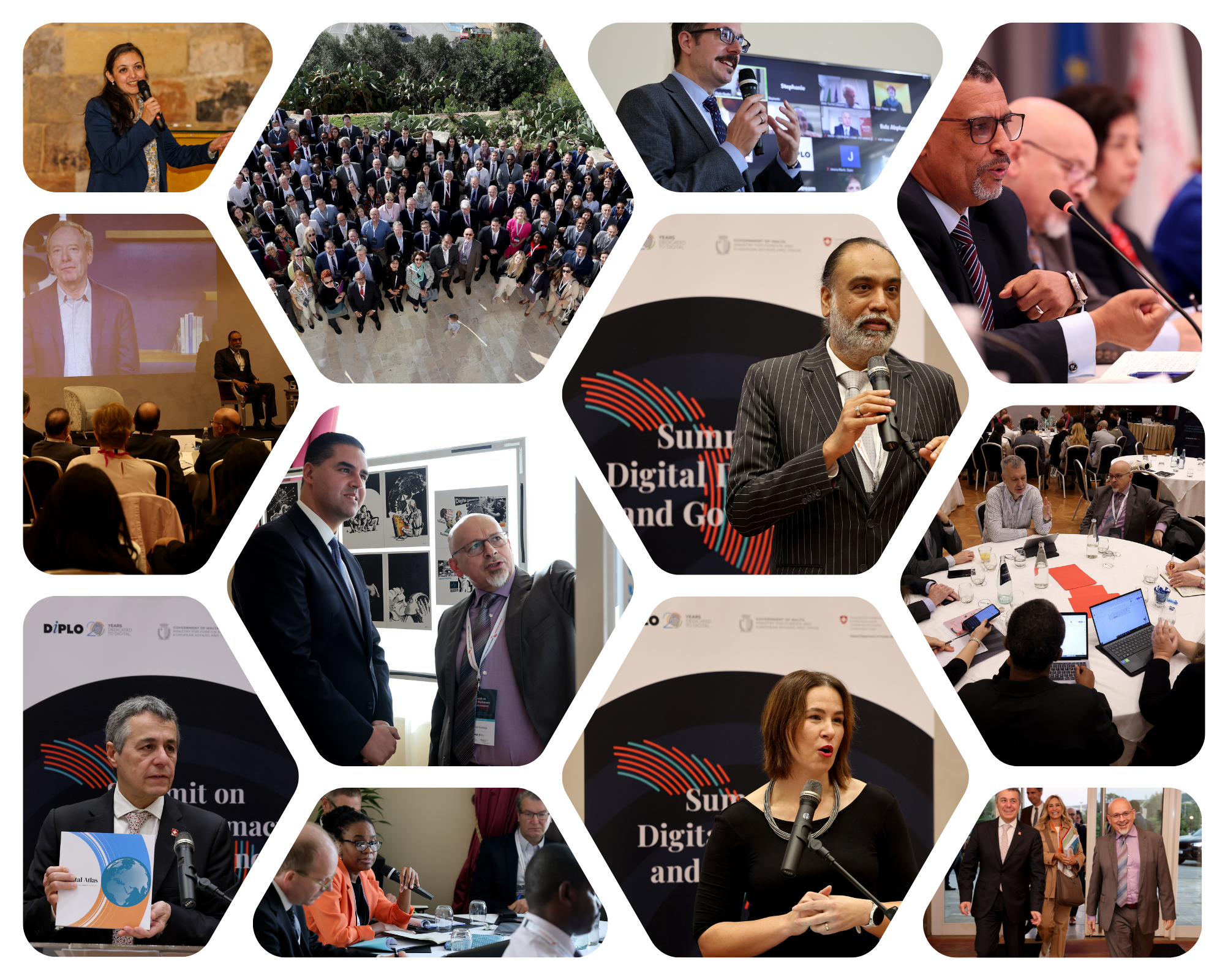
Highlights from the Summit on Digital Diplomacy and Governance
The nature of digital diplomacy and governance has changed. What was once a discussion about the internet and the technology behind it has now expanded to tackling almost every facet of everyday life. ‘Digital’ is everywhere.
THE SUMMIT IN NUMBERS

KEY MESSAGES
1. New digital geopolitics and geo-economics
- As digital networks have become the critical infrastructure of modern society, they also entered global geopolitics: from the safety of submarine cables to the flow of data across borders, and the power of tech giants. Digital geopolitics have become a priority for countries and diplomatic services worldwide.
- Digital is emerging as one of the global commons, and the tragedy of the commons is repeating itself with misuse, risks, safety and security issues, privacy, data protection, and cyberweapons, making it difficult to deploy commons for good.
2. New digital geopolitics and geo-economics
- Diplomacies worldwide have started to apply foreign policy priorities in the digital realm. The main challenge is to find the right interplay between digital sovereignty and interdependence. Countries have to protect their vital data and digital infrastructure while being part of international networks that facilitate e-commerce, tech platforms, and other digital services.
- Traditional diplomacy has to find new ways to cover digital policy issues through cooperation with new actors from the tech community, businesses, civil society, and academia.
3. New digital tools for effective and efficient diplomacy
- Digital tools for diplomats evolved through three main phases: (a) websites and databases in the 2000s; (b) social media in 2010s; (c) the current phase of online conferencing, AI, and the metaverse.
- Digital tools have been used most intensively in consular activities and public diplomacy. Pandemic crisis mainstreamed online conferencing into negotiations and work of international organisations.
SUMMING UP THE PRE-EVENT – 17 Nov. 2022
Pre-event Meeting for Tech Envoys and Ambassadors
By Andrijana Gavrilovic
Discussions about digital issues are no longer just discussions about technology. Digital is not just about cables anymore – it is impacting humanitarian issues, digital health, the environment, and all other issues across the board.
Countries need to make sure that digital governance is not a private sector-led initiative, and that government perspectives are brought to the table. The Summit on Digital Diplomacy and Governance, organised by Diplo, which was founded by two small countries (Malta and Switzerland), is proof that small countries can and should take leadership in the digital world. Cyber and tech ambassadors (and envoys and other key officials with responsibility for digital issues) have a significant role to play.
SUMMING UP DAY 1 – 18 Nov. 2022
High-level opening
By Andrijana Gavrilovic
‘Digital is the future, and we are committed to it. If there is one domain that cuts across any ecosystem that is surely the application of digital technologies’, Dr Robert Abela, Prime Minister of Malta said in his keynote during the first day of the Summit on Digital Diplomacy and Governance, on 18 November 2022.
Digital diplomacy is one of the key soft power tools used in the delivery of modern public diplomacy. ICTs have transformed the way in which governments engage with each other and with their respective audiences, completely altering the way how messages are conveyed. Social media has become a key tool to engage with citizens and participate in online conversations about key events and topics of shared priority.
Digital governance and cooperation: Towards a Global Digital Compact
By Boris Begovic
#1 Connectivity and accessibility: Two sides of the same coin?
This round table’s main topics of discussion – both in person and online – were vulnerable populations or, more precisely, how to ensure accessibility for these groups. Vulnerable groups may already have full access to the internet and digital technologies, but they still face barriers to true accessibility. Access and accessibility are different notions, and carry different challenges.
The Global Digital Compact needs to rally more support for access through capacity development and free and open flows, unencumbered by blockages. It should also push for more accessibility, not only for vulnerable groups but also in terms of multilingualism, a prerequisite for the promotion and development of cultural diversity.
Diplomatic processes: The state of play in negotiations
#1 Cybersecurity: What’s happening at UN GA’s First and Third Committees, OEWG, and POA, and how are developing countries participating in the process?
By Yung-Hsuan Wu
Diplomatic processes around cybersecurity negotiations have leapt to the front page as digital spaces become an increasingly popular battleground for inter- and intrastate conflict. Key venues for such processes include the UN General Assembly’s (UNGA) First and Third Committees and the Open-ended Working Group (OEWG).
Speakers agreed that capacity building measures are particularly critical to ensuring cyber peace and preventing accidental outbreaks of cyber conflicts. The 2014/15 session of the OEWG also introduced the influential UN norm of responsible state behaviour in cyberspace, further infusing trust and laying the foundation for countries to gradually move to discuss international law and soft law.
Emerging technologies: New issues on diplomatic agendas
#1 Metaverse: Old wine in new bottles?
By Boris Begovic
The metaverse will present similar opportunities and concerns as today’s internet and building the metaverse will be expensive, participants noted. Therefore, the issue of the digital divide between developed and developing nations will persist – and potentially worsen – given that the metaverse depends on resilient infrastructure, high computational power, and costly wearable technology. If the metaverse is to develop into a 3D version of the internet, it must be interoperable – an interconnected network of many platforms, a task that will not be easy.
The metaverse, participants felt, would exacerbate the security challenges currently present on the internet. The issue of trust in the metaverse was mostly discussed in relation to data protection and surveillance.
SUMMING UP DAY 2 – 19 Nov. 2022
High-level Panel: How can we prepare diplomats for 2032 and beyond?
By Jovan Kurbalija
The session focused on the talents, skills, and knowledge that diplomats need to deal with the world of 2032. The uncertainty ahead of us can be addressed by two certainties:
- Diplomacy was, is, and will remain a representation of interests through negotiations and other peaceful means. Today, diplomats represent the interests of countries. Tomorrow, they could represent other actors, given that society and its needs evolve.
- It is certain that technological growth will create, and require us to use and understand, an increasing number of digital tools and platforms.
With these two certainties in mind, the following points discussed during the panel are necessary steps for diplomats to take towards 2032 and beyond:
How-to: Digital geopolitics
By Anamarija Pavlovic
#1 How can we identify strategic trends in technological developments while avoiding pitfalls and hype?
More often than not, new technologies start a trend and become a hype. The discussions revolved around the questions: Do policymakers and end users understand new technologies? How can we assist policymakers in gaining a deeper understanding of technology? Do we start considering policies only when tech developments become over-hyped?
Often, technologies and the surrounding hype are misused for quick gain. Hype is used to make profit. Countries are also often under pressure to be early adopters of technology and to get ahead very fast. And yet, no one wants to admit that the technology is barely understood; that those spinning hype have little idea of how the technology itself works.
How-to: Digital topics
By Yung-Hsuan Wu
#1 How are countries and the private sector collaborating to tackle the spread of disinformation, hate speech, and other types of unwanted content?
The spread of fake information is not a new problem. The prevalence of online platforms has simply exacerbated an existing problem, and has led to an unprecedented spread of fake, harmful, and unwanted content.
There are three major types of disinformation: cases where accurate information is published before an official statement, cases where wrong information is spread as a propaganda tactic, and publishing incomplete or unverified information.
How-to: Digital tools
By Bojana Kovac and Teodora Markovic
#1 How can we ensure effective use of social media, and other emerging online spaces such as the metaverse, in diplomacy?
Thanks to social media and other emerging online public spaces, diplomats have been able to interact with larger audiences. The use of social media in diplomacy scales up the communication between target audiences, enhances communication with foreign publics, and enables under-resourced small states to be heard better. To further enhance digital diplomacy, social media needs to ensure that every diplomat is able to participate.
At the same time, the fragility of certain platforms (such as Twitter) raises questions on the long-term effectiveness of social media.
Diplomats need to look beyond the government sphere for best practices on the use of online spaces. They also need to be able to communicate in different ways to remain effective.

